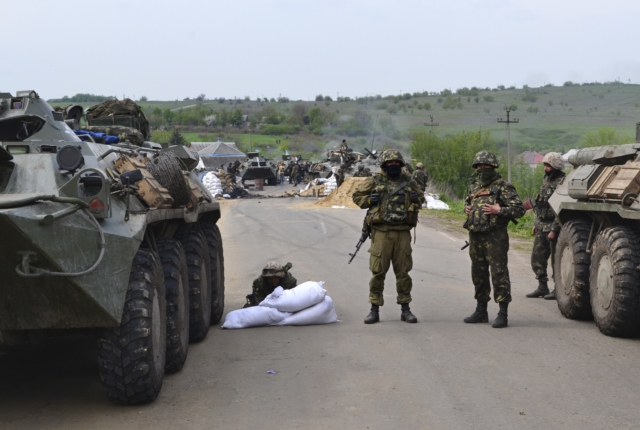Two Ukrainian helicopters were shot down Friday as Ukraine launched its first major offensive against anti-Kiev forces that have seized government buildings in eastern Ukraine. The Kremlin said Kiev’s move “destroyed” hopes for peace in the region.
Fighting broke out around dawn near Slovyansk, a city 160 kilometers (100 miles) from the Russian border that has become the focus of the eastern opposition in Ukraine. Two helicopter crew members were killed in the crashes, both sides said, and an anti-Kiev militiaman was reported killed.
One of the helicopters was hit by a surface-to-air missile, the Ukrainian Security Service said, adding that the sophisticated weapon undercut Russia’s claims the city was simply under the control of armed locals. The service said its forces were fighting “highly skilled foreign military men” in Slovyansk.
By late afternoon, the Ukrainian Security Service said the army controlled half of Slovyansk — a claim that could not be immediately verified. Central Slovyansk still remained in the hands of anti-government gunmen, according to AP journalists in the city. Several foreign news crews were detained for several hours Friday before being released.
A clash also broke out late Friday between anti and pro-government supporters in Odessa, on the Black Sea coast some 550 kilometers (330 miles) from the turmoil in the east. Odessa had remained largely untroubled by unrest since the February toppling of pro-Russia President Viktor Yanukovych, which ignited tensions in the east. News reports said several people were wounded, but there was no immediate official information.
In Moscow, Russian President Vladimir Putin’s spokesman said the Ukrainian offensive “effectively destroyed the last hope for the implementation of the Geneva agreements” that aimed to defuse the crisis. But Dmitry Peskov said Russia “continues to undertake consistent efforts on de-escalation.”
A day earlier Putin warned Ukraine not to move against the anti-Kiev militia and said it should withdraw its military from eastern and southern regions.
Meanwhile, Defense Secretary Chuck Hagel has stated that Russia’s military moves in Ukraine “shatter the myth” that the end of the Cold War meant an end to insecurity, at least in Europe.
In remarks prepared for delivery at a Washington think-tank, Hagel renewed a call for increased defense spending by NATO members and said even a united Europe still faces great dangers.
“While we must continue to build a more peaceful and prosperous global order, there is no postmodern refuge immune to the threat of military force,” Hagel said, according to excerpts provided in advance of his speech at the Woodrow Wilson International Center for Scholars. “And we cannot take for granted — even in Europe — that peace is underwritten by the credible deterrent of military power.”
Hagel said NATO members need to boost their defense investment because over the long run Russia will test the purpose, stamina and commitment of the 28-nation U.S.-led alliance.
“In recent years, one of the biggest obstacles to alliance investment has been a sense that the end of the Cold War ushered in an ‘end of history’ and an end to insecurity — at least in Europe — from aggression by nation-states. Russia’s actions in Ukraine shatter that myth and usher in “bracing new realities,” Hagel said in his prepared remarks.
He called for the inclusion of budget officials at a future NATO defense ministers meeting focused on ways to break the pattern of steadily declining defense budgets among European member states. NATO’s defense ministers, including Hagel, are scheduled to meet in June, followed by a gathering of alliance foreign ministers, including Secretary of State John Kerry. President Barack Obama is due to attend a NATO summit in Wales in September.
Report compiled with information from The Associated Press.
 CGTN America
CGTN America Ukrainian government troops guard a checkpoint just outside Slovyansk, eastern Ukraine, Friday, May 2, 2014. Ukraine launched what appeared to be its first major assault against anti-Kiev forces who have seized government buildings in the country’s east, with fighting breaking out Friday in a city that has become the focus of the opposition. (AP Photo/Andrei Petrov)
Ukrainian government troops guard a checkpoint just outside Slovyansk, eastern Ukraine, Friday, May 2, 2014. Ukraine launched what appeared to be its first major assault against anti-Kiev forces who have seized government buildings in the country’s east, with fighting breaking out Friday in a city that has become the focus of the opposition. (AP Photo/Andrei Petrov)
